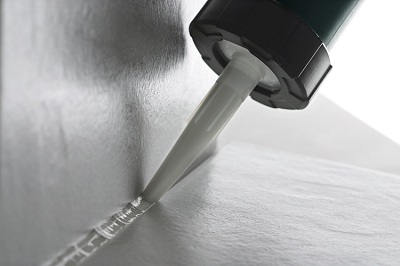WACKER is extending its silicone portfolio to include silicone sealants based on renewable raw materials. With its ELASTOSIL® eco brand now launched in Europe, WACKER is able to offer products manufactured using bio-based methanol to silicone sealant suppliers. The new brand is based on the REDcert2 standard which confirms the traceability of renewable raw materials across WACKER’s entire production process – from the initial upstream process to the ready-to-use silicone sealant.
ELASTOSIL® eco is WACKER’s first approach to encompass and compensate all fossil-based raw materials and additives in the product formulation by using bio-based methanol. To qualify, the purchased biomethanol has to be obtained from certified sustainable sources. Raw material volumes needed for manufacturing undergo regular audits as part of an annual recertification process. “WACKER offers a comprehensive carefree package and thus the chance to be a first-mover supplying a sustainable silicone sealant in the market”, says Axel Schmidt, responsible for the company’s sealants & adhesives business.
Currently, acetic and alkoxy curing silicone sealants containing 100% silicone are available as ELASTOSIL® eco products. Acetoxy curing sealan ts have a long shelf life and are frequently used for professional construction applications. Alkoxy curing grades exhibit outstanding adhesion and elongation in glazing and window applications as well as selected industrial applications. Both are equally available as versions for professional sanitary applications.

The ELASTOSIL® eco portfolio also includes a chalk filled alkoxy-curing silicone sealant. With its matt appearance and outstanding adhesion profile, it is a grade found in weather-seal applications. While WACKER produces and packages the sealant, compounders and distributors will be able to market the products under their own brand based on ELASTOSIL® eco. “Individual homeowners across Europe and professional users will be able to purchase eco-friendly and resources saving silicone sealants for any kind of improvement activities”, Axel Schmidt points out. “Our pioneering ELASTOSIL® eco brand paves the way to an increasing share of sustainably manufactured construction chemicals in the years to come.”
Biomass Balance Method
Silicone sealants primarily consist of several components: a silicone polymer that cures at room temperature to form a rubber-like elastomer, plasticizers, fillers and additives.
Apart from silicon, which is manufactured by reducing quartzite with coke, an important raw material for manufacturing the polymer used for silicone sealants is methanol. WACKER uses methanol derived from fossil raw materials and from biomass. If methanol from both plant- and fossil-based sources is used within an integrated production system, the portion of raw materials derived from biomass can be determined and explicitly allocated to individual sales products.
WACKER already uses this officially certified method for manufacturing biomethanol-based silicone products for the textile, paper and consumer goods industries and for producing vinyl acetate ethylene copolymer binders based on bio-based acetic acid. The mass balance approach of ELASTOSIL® eco encompasses the entire formulation of the ready-to-use silicone sealant and compensates all fossil-based raw materials and additives by using bio-based methanol.














